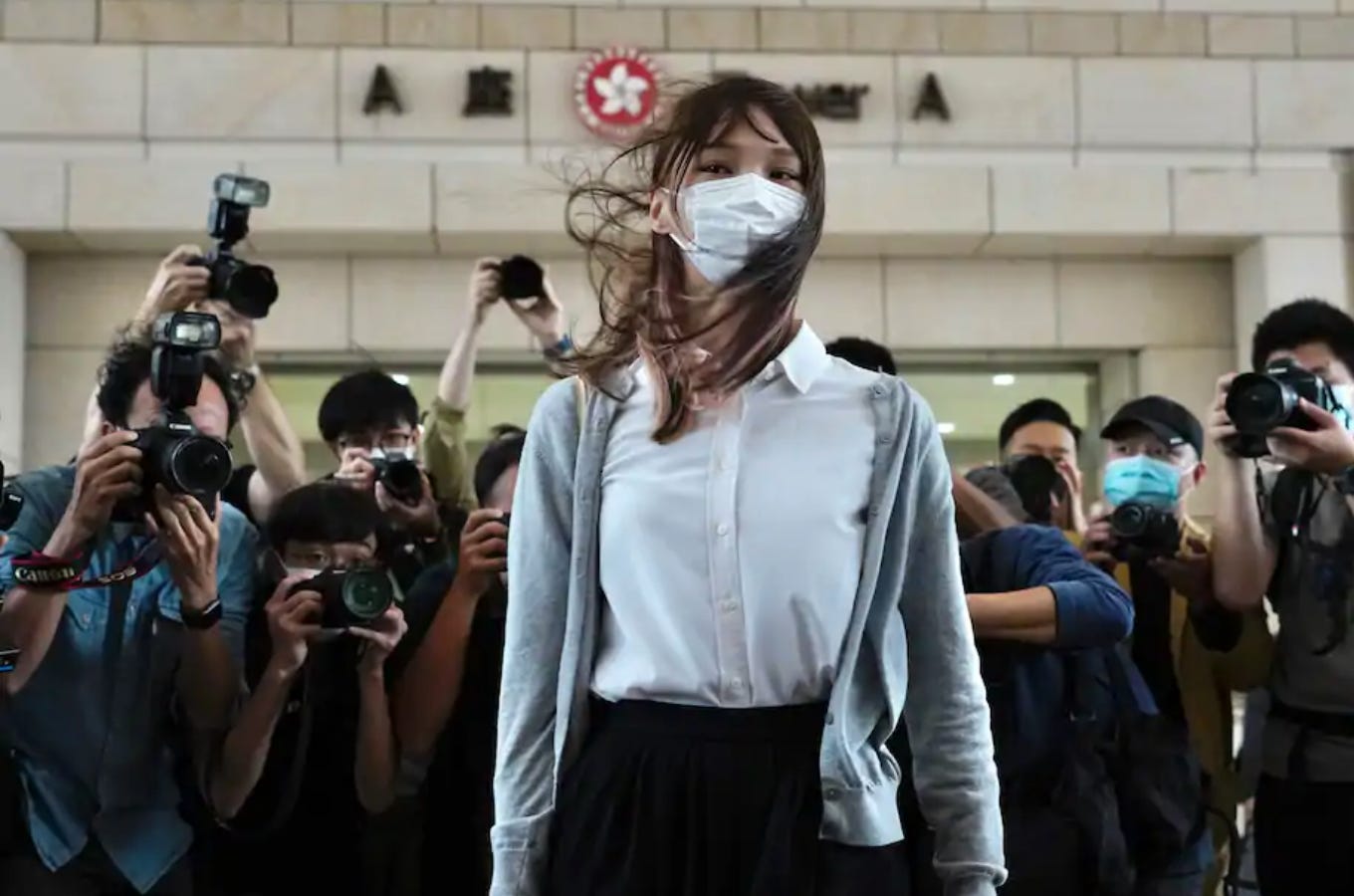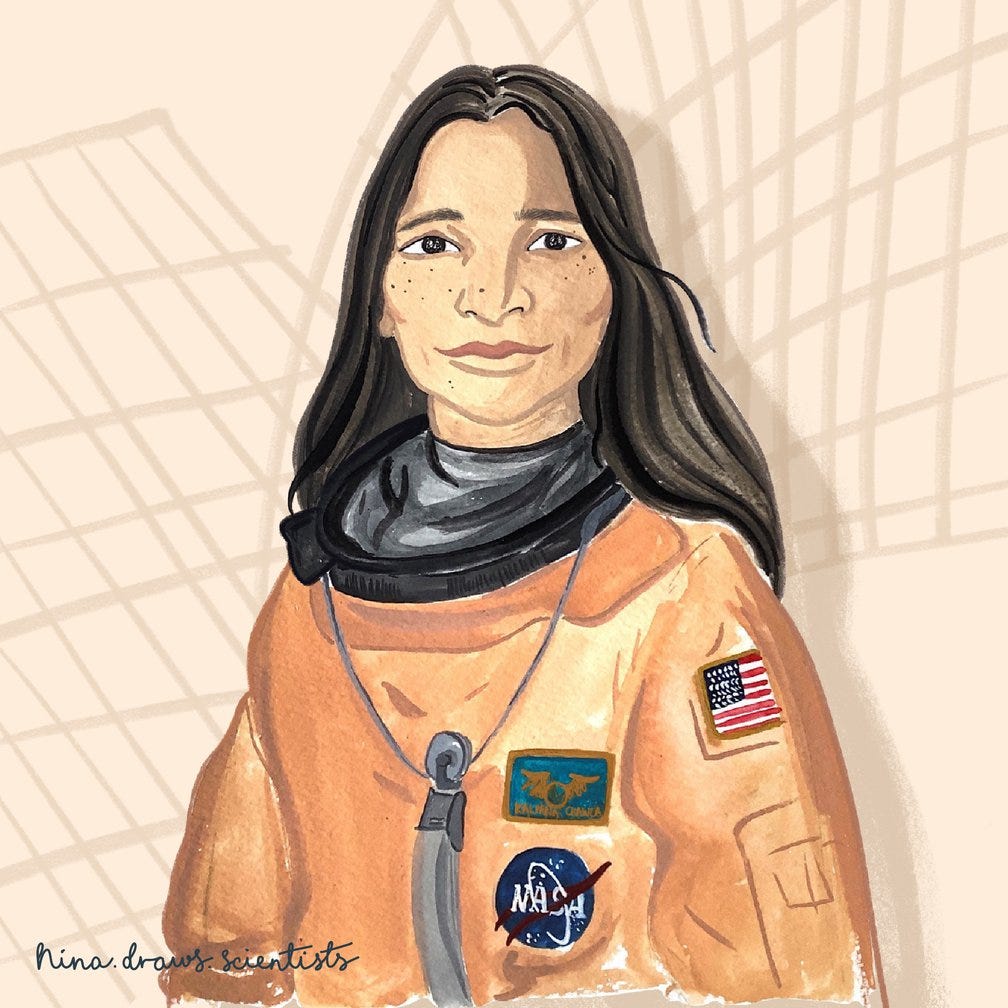Global Roundup: Resistance in Hong Kong, Sex Workers on the African Continent, Women in STEM, Migrant Workers in Lebanon and a Singapore LGBT+ Podcast
Compiled and written by Samiha Hossain
Agnes Chow at the West Kowloon Magistrates’ Courts in Hong Kong on Nov. 23, where she faced charges stemming from protests in 2019. She was remanded in custody ahead of her sentencing Dec. 2. (Vincent Yu/AP) via The Washington Post
Agnes Chow, a 23-year-old Hong Kong democracy activist, was sentenced to 10 months in prison on Wednesday for her role in massive anti-government protests that took place last year. Her fellow young activist Joshua Wong was sentenced to 13 and a half months in prison while Ivan Lam, a third member of their disbanded political group, Demosisto, was sentenced to seven months.
Chow has a particularly large following in Japan. She relates to the audience there via her live broadcasts on YouTube by speaking Japanese (which she taught herself as a teenager) and showing an appreciation for Japanese pop culture.
Because I was arrested at my home twice, I am very scared of doorbells and knocks on the door…I am traumatized - Agnes Chow
Furthermore, she has attended talks at Japanese universities and maintained a strong social media presence. Her activism has raised awareness and caused many Japanese people to want Tokyo to firmly criticize China over its violations of freedom in Hong Kong. To date, Japan has yet to take a strong stance against China in fear of negatively affecting their economic relations with the country.
Wong, Lam and Chow graced magazine covers as teenage faces of the 2014 Umbrella Movement, a 79-day street occupation that called on China to allow Hong Kong residents to vote freely for the city’s leaders.
Though the movement failed to achieve its goals, the activists helped to solidify a Hong Kong identity, politically and culturally distinct from the Chinese mainland.
In a 2017 speech at the University of Tokyo, she admitted she was “not at all interested in politics” and was an “ordinary otaku” who did not like to study — a Japanese term for someone obsessed with a particular aspect of pop culture.
A video clip of that speech aired in a news feature last summer on TBS, a Japanese broadcaster, titled “The Real Face of Hong Kong ‘Goddess of Democracy’ Agnes Chow.”
--------------------------------------------------------------------------------------------------
A sex worker receives clinical advice and testing for HIV at a centre for sex workers and transgender people, which is supported by UNFPA, in Mtwapa, Kilifi County, Kenya Via AllAfrica.com
COVID-19 has led to particular challenges for sex workers in Africa, including loss of income, police crackdowns, exclusion from social protection schemes, and increased violence from both clients and intimate partners. The pandemic has driven sex work further underground, which has resulted in more unsafe situations for sex workers and potential for forced unsafe sex.
Targeted prevention programs have been key in reducing the spread of HIV and other sexually transmitted infections, as well as other health services for sex workers. With the lockdown, these programs have shifted to tele-counselling, multi-month prescription of medication and home deliveries of contraceptives, condoms, lubricants and food packages for those in need. Still, in many cases access remains an issue - one Ugandan sex worker in need of condoms visited a health centre twice where the staff were absent due to a lack of public transport. She then had no option but to engage in unsafe sex.
According to UNAIDS, with the loss of livelihood and fewer employment opportunities, sex work and sexual exploitation is likely to increase. In Uganda, 1 in 3 female sex workers lives with HIV, a prevalence rate 5 times higher than the national rate. Therefore, it is imperative that the COVID-19 response centres sex workers and HIV prevention and care.
--------------------------------------------------------------------------------------------------
Ethiopian domestic workers wearing masks stand with their belongings in front of the Ethiopian consulate in Hazmiyeh, Lebanon, June 8, 2020. REUTERS/Mohamed Azakir
COVID-19, economic collapse, and the aftermath of the recent explosion have negatively impacted mental health for people in Lebanon, particularly for migrant workers. Charities state that an increasing number of migrant maids are suffering from conditions such as panic attacks and post-traumatic stress disorder. According to Antonin Guinche, a psychologist at Doctors Without Borders, “by the end of November, 170 migrant workers had requested mental health support through the helpline, 60% of whom were considered to be in severe psychological distress”.
They're always in the house and there is so much more work to do. I want to die. They used to be so nice, but now the economic crisis is affecting them and all of the bitterness is landing on me and they threaten me all the time - Sarah, migrant maid
Since the pandemic, migrant workers have reported heavier workloads, withhold of pay, abuse from employers, feelings of being trapped and an inability to send money back home. Furthermore, the country faces a shortage of psychiatry drugs due to the economic crisis hitting imports of medical supplies. Several maids have even been abandoned on the streets, as employers can no longer afford them.
The majority do not have enough funds to fly back home and have been calling on their home countries to repatriate them free of charge. Those that leave their employers are considered illegal immigrants in the country. Migrant workers do not deserve to live in fear, trauma and isolation. The government must step up to support these workers and include them in the COVID-19 response.
There are at least 250,000 migrant workers, mostly women from Africa and Asia, who work in Lebanon as housekeepers, carers or nannies. Activists have long called for abolishing the Kafala system that has been criticized for inhumane, slave-like conditions.
—————————————————————————————————————
Dr Kalpana Chawla, the first woman of Indian origin to travel into space, in 1997. Nina Chhita Via OpenDemocracy.com
Women in STEM are using social media to teach their audience about math and science, increase visibility of women in the field and subverting stereotypes. Deactivation and harassment are common occurrences for these accounts. For instance, How 2 Rob a Bank is an instagram page run by business and data analyst Bia Kazmi, to encourage people to use math and science in their everyday lives. The account posted the solution to a particularly difficult and controversial mathematical conundrum. A man and his followers then harassed the account for being wrong about the problem in their view, which led to the temporary deactivation of the account.
We had a Christmas quiz at work, and there was a section called ‘name the scientist…Fewer than half of them were women, there were no women of colour, and most people couldn’t even name Rosalind Franklin, which I personally found uncomfortable. Our knowledge is lacking, and I think this has a big impact on how we see scientists - Nina Chhita, medical writer, illustrator, founder of Instagram page Nina Draws Scientists
According to UNESCO, only 29% of researchers are women globally - they are often published less and receive less pay than their male colleagues. Despite increasing visibility, women face online harassment and negative comments. Women in STEM are criticized for looking too feminine such as wearing heels, makeup or wearing a bikini outside of their professional lives.
Despite these clearly misogynistic attitudes, women in STEM continue to use social media in creative ways to make it known that they will not be silenced. Their work serves as important inspiration to the next generation of women scientists.
--------------------------------------------------------------------------------------------------
Hosts of The SG Boys, a podcast in Singapore about gay people, pose for a photo. Photo courtesy: Ya Ting/The SG Boys Via Reuters
The SG Boys is a new podcast focusing on LGBT+ issues hosted by three Singaporean gay men. This is a huge milestone, particularly in a country where homosexuality is illegal. One of the hosts, radio DJ Joshua Simon was inspired to start the podcast when he was asked last year to tone down talk about his sexuality in his TEDx speech, which led him to drop out.
I was ready to give my true self, but Singapore wasn't ready for me to tell my story, so I thought let's do the podcast I wish we had - Joshua Simon
The aim of the podcast is to increase positive representation of the LGBT+ community and to counter common homophobic and transphobic narratives such as the LGBT+ community are predators and responsible for spreading HIV/AIDS. The podcast has gained traction since its release with well-known guests such as Mel C from Spice Girls and American singer-songwriter Lauv.
The podcasters are aware of the risks of them being so publicly out, as Section 377A, of Singapore law can sentence men found to have committed an act of "gross indecency" with another man up to 2 years in prison. However, the podcasters hope to start a conversation of change and see it as “a challenge and opportunity to be brave”.
————————————————————————————————————
Samiha Hossain (she/her) is a student at the University of Ottawa. She also works with survivors of sexual violence in her community from an anti-oppressive and trauma-informed perspective. A lot of her time is spent learning about and critically engaging with intersectional feminism, transformative justice and disability justice.
Samiha firmly believes in the power of connecting with people and listening to their stories to create solidarity and heal as a community. She refuses to let anyone thwart her imagination when it comes to envisioning a radically different future full of care webs, nurturance and collective liberation.






